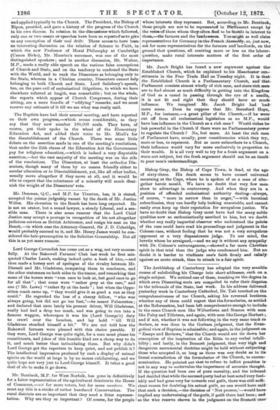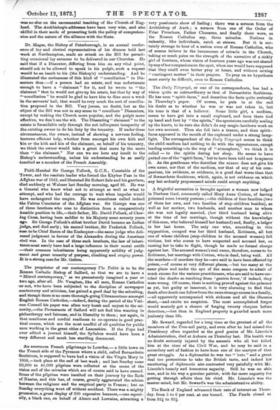The Archbishop of Canterbury has adopted the very sensible course
of subdividing his Charge into short addresses, each on a- single subject. We noticed one of these, touching on the degreein which even Dissenting-sects are compelled to refer their disputes. to the tribunals of the State, last week. In his address delivered- yesterday week in Canterbury Cathedral, Dr. Tait touched on the- comprehensiveness of tee Church, asking, his reverend. brethren whether any of them could regret that the formularies, as settled at the Reformation, had been left comprehensive enough to include in the same Church men like Wilberforce and Simeon with men like Paley and Tillotson, and again, with men like George Herbert ;. and if not, whether it was not following in the very same track to declare, as was done in the Gorham judgment, that the Evair- gelical view of Baptism is admissible; andagain, in the jadgment on "Essays and Reviews," that the Church would not tie down her conception of the inspiration of- the Bible to any verbal infalli- bility; and lastly, in the Bennett judgment, that very high and dangerous sacramental doctrine might be held without subjecting those who accepted it, so long as there was any doubt as to its- literal contradiction of the formularies- of the Church, to excom- munication. He pointed out that to refuse to inflict penalties is- not in any way to undervalue the importance of accurate thought. If the question had been one of pure morality, and the tribunal- had decided that while the accused party had at bestected very fool- ishly and had gone very far towards real guilt, there was still suffi- cient reason for doubting his actual guilt, no one would have said that such a decision,—the decision of 'Not proven,'—would have implied any undervaluing of the guilt, if guilt there had been ; and so the wise reserve shown in the judgment on the Bennett case
-was.= slur on the sacramental teaching of the Church of Eng- land. The Archbishop's addresses have been very wise, and also skilful in their mode of presenting both the policy of comprehen- sion and the nature of the alliance with the State.



































 Previous page
Previous page